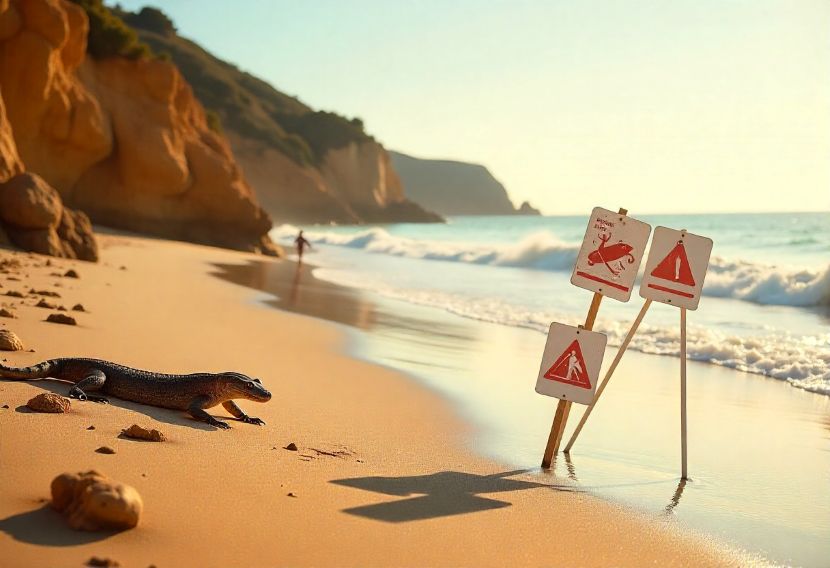Home » Latest Travel News of Spain » UK, Germany, and Netherlands Travelers Face Spain’s Beach Closures Due to Venomous Blue Dragons: What You Need to Know
Published on
August 27, 2025
Spain’s Guardamar del Segura beaches, located along the Mediterranean coast, are temporarily closed after the appearance of blue dragons (Glaucus atlanticus). These venomous sea slugs, while small in size, pose a significant risk to swimmers. Authorities are urging caution as they issue public safety alerts for the region’s beaches to UK, Germany, and Netherlands Travelers, which are a major tourists to this spot.
What Are Blue Dragons?
Blue dragons are a type blue-colored sea slug appearing in every ocean which the world has to offer. Even though blue dragons look beautiful, they are dangerous. Blue dragons have the ability to give a painful sting which can result in nausea or more harmful allergic reactions. Blue dragons are capable of stinging a Portuguese man o’ war and focuses the poison in their body which means they can take blue dragon venom. Thus, blue dragons are capable of defending themselves.
Why Are Beaches Closed?
Authorities in Guardamar del Segura, a popular beach town in the Alicante region, have issued a beach closure notice for all municipal beaches. The presence of blue dragons on the shores has raised safety concerns, prompting local officials to ban swimming until further notice. The town’s police force has urged residents and tourists to avoid any contact with these creatures, even if they are seen in the sand.
Health Risks and Safety Concerns
Blue dragons can inflict painful stings which can lead to severe bodily reactions. While not fatal, their sting can lead to debilitating suffering, inflammation, and debilitating dizziness. For treatment, the injured person should wash the affected region with saltwater (not freshwater) to neutralize the inflicted venom. It is also advisable to see a physician immediately after, especially in case of allergic reactions.
How Did Blue Dragons End Up in Spain?
Though blue dragons are typically found in temperate and tropical oceans, they have been increasingly spotted in Mediterranean waters, particularly along the coast of Alicante. Scientists believe that ocean currents or wind patterns may have carried the slugs into the region. Their appearance is unusual, but not unheard of, with blue dragons occasionally appearing along the Spanish coast.
Impact on Tourism in Guardamar del Segura
The Guardamar del Segura beaches are a popular tourist destination, known for their fine sands and crystal-clear waters. The beach closures are disrupting the local economy, affecting hotels, restaurants, and tour operators that depend on the summer tourism rush. Tourists visiting Alicante for beach vacations now face uncertainties, as they are advised to check for updated beach conditions before traveling.
In the meantime, travel agencies and local businesses are working around the clock to keep travelers safe and informed with during the border closure. Some are suggesting travelers to partake in Alicante’s historic and gastronomic sites, or enjoy day trips to the cultural and mountainous landmarks.
What Should You Do If You Spot a Blue Dragon?
If you see a blue dragon on the beach, do not touch it with bare hands, even if you are wearing gloves. Local authorities urge people to report sightings so that measures can be taken to safely remove the creatures from public spaces. If you are stung, remember to rinse with saltwater and seek medical attention immediately.
Future Plans for Guardamar Del Segura
As of now, local officials are working on assessing the situation and ensuring that the beaches are safe for visitors. The Guardamar del Segura police force and town officials have emphasized that they will continue to monitor the beaches and will reopen them as soon as it is safe to do so.
Jose Luis Saez, the mayor of Guardamar del Segura, has urged the community to curb panic and stick to all the provided safety measures. He emphasized to the public that these incidents, although unusual, demonstrate the need to abide by common sense in regard to local biodiversity as well as obey government regulations.
How to Stay Safe on Spanish Beaches
To ensure your safety while visiting Spanish beaches this summer, always follow local advisories. Avoid swimming in areas that have been closed to the public and remain cautious when walking along the shorelines where blue dragons might be spotted. It’s also essential to stay informed about local beach conditions through official sources, including local government websites.
Will Beaches Reopen Soon?
Though a specific date for reopening the Guardamar del Segura beaches has yet to be announced, the local government is actively working to address the matter. The reopening for public use is projected to happen once the blue dragons no longer inhabit the area close to the beaches. Tourists, meanwhile, are advised to follow local updates.
